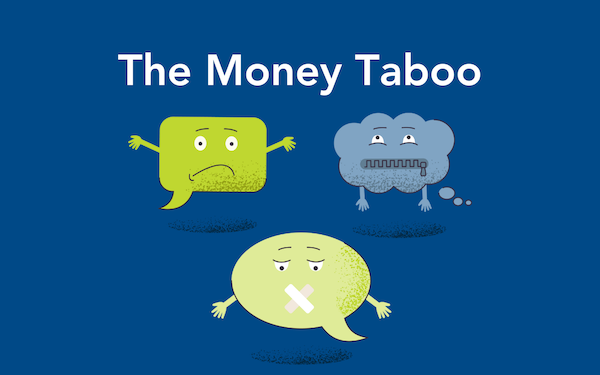Money: it’s a subject that often gets sidestepped at dinner tables, avoided in couple’s conversations, and is generally considered a bit of a social no-go. But why is that? Let’s unravel this mystery together and explore why it’s high time we broke the money taboo.
The Uncomfortable Truth
Despite the facade of open communication, many of us are not as in sync with our partners about finances as we think. A 2021 Couples & Money Study by Fidelity Investments reveals a startling disconnect:
- 71% of couples believe they communicate well about money, yet …
- 44% argue about it at least occasionally
- Nearly half disagree on retirement age, and
- a whopping 51% can’t agree on retirement savings
Even more intriguing is a survey conducted by OnePoll for Questis, finding that 56% of people see money talks as taboo, yet 81% can’t pinpoint why. I’ll admit, I was in that 81% before researching it!
This conundrum extends beyond just personal relationships; it’s a societal issue, with a global survey by deVere Group highlighting that money is a bigger taboo than sex, religion, or politics.
And here I thought that talking about the birds and the bees over the dinner table was more of a no-go than what credit cards I’ve got.
The Roots of the Taboo
How did we get here? It’s a mix of cultural beliefs, social norms, and perhaps a dash of old-fashioned awkwardness. Our society often equates wealth with value, making financial discussions feel like personal evaluations. The Nordic concept of Jantelagen sums it up well: don’t think you’re better than anyone else, and keep your financial status private to maintain this balance.
Moreover, discussing money—or the lack thereof—can unveil inequalities that are easier for society to ignore. As Joe Pinsker pointed out in The Atlantic, not talking about money helps blur the economic lines, reducing societal discontent, which can be seen as a good thing for corporations and governments. It’s a stabilising, yet ultimately harmful, silence.
The Cost of Silence
This silence has real consequences. For starters, it contributes to the perpetuation of pay gaps. Research on public sector salary disclosure laws in Canada found that transparency reduced the gender pay gap by 20-40 percent[1]. Clearly, when we talk about money, we empower individuals to demand fairness.
On a personal level, not discussing finances can lead to a sense of isolation and stress. 60% of respondents in a survey admitted to losing sleep over financial worries, a clear indication that the taboo is affecting our mental health.
Breaking the Cycle
It’s crucial to challenge this taboo for both societal and personal growth. Here’s why:
- Transparency breeds equality: Open discussions about salaries and financial expectations can help address and correct pay disparities
- Financial literacy is empowering: By talking about money, we educate ourselves and others, making informed decisions about our financial futures
- It’s about mental health: Reducing financial stress by sharing concerns and solutions can lead to a healthier, more balanced life.
Mary Gresham, in Voices: Journal of the American Academy of Psychotherapists, encapsulates the issue beautifully: the silence around money, rooted in our upbringing, shapes our adult financial behaviours. This “Intergenerational Echo” shapes how we view and handle money, often to our detriment.
Final Thoughts
The taboo around discussing money serves no one. It fosters inequality, perpetuates gender pay gaps, and isolates individuals dealing with financial stress. By opening up the conversation, we can build a culture of transparency, equality, and financial literacy. Let’s start breaking the money taboo, one conversation at a time. It’s not just about money; it’s about fairness, empowerment, and well-being.
So, let’s talk about it, shall we?
[1] Michael Baker & Yosh Halberstam & Kory Kroft & Alexandre Mas & Derek Messacar, 2023. “Pay Transparency and the Gender Gap,” American Economic Journal: Applied Economics, vol 15(2), pages 157-183.

